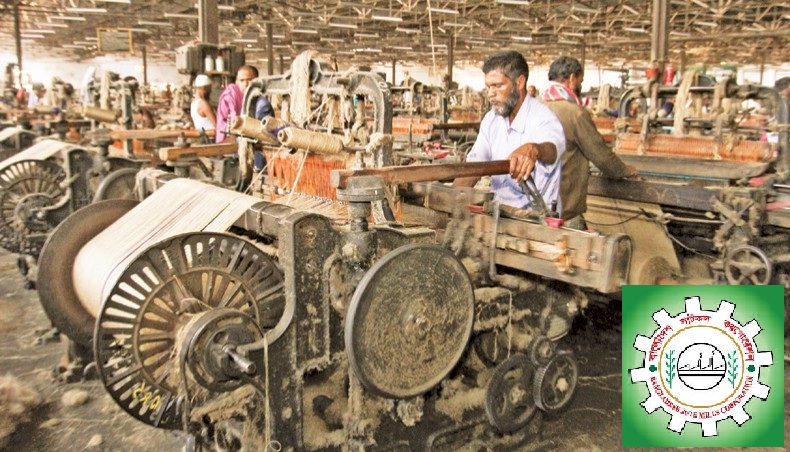
Gov. Decision: BJMC mills to be privatised

The government has decided to stop operating the state-owned jute mills under the Bangladesh Jute Mills Corporation due to huge amounts of recurring losses year after year.
To implement the decision, the government on Thursday held a number of meetings at different ministries at the Bangladesh Secretariat.
According to sources, the government is going to hand over the mills to the private sector actors who have expertise in the area.
Recently the decision on shutting the state-owned jute mills came from the top level of the government and the textile and jute ministry on Thursday held a meeting to find a way on how to implement the decision.
The meeting, held at the home ministry, was presided over by jute and textile minister Golam Dastagir Gazi.
Home minister Asaduzzaman Khan and state minister for labour Monnujan Sufian attended the meeting as guests.
‘The state-owned jute mills have been incurring huge losses over the years and it is not possible for the government to run the mills with vast subsidies every year,’ Golam Dastagir told reporters after the meeting.
He said that 95 per cent of the country’s jute mills were being operated in the private sector while the government was running only 5 per cent.
The minister said that the mills would be handed over to the private sector businesses and they would be run under the public-private partnership.
According to the minister, the government had decided to pay the dues of the workers before shutting the operation of the mills but it would not be possible right now due to the coronavirus pandemic.
‘The workers will get their lawful benefits in phases over a three-month period and the first installment will be disbursed by the first week of September,’ Golam Dastagir said.
There were nine thousand workers who retired from jobs in the last few years but not received their dues. They would also be paid, he said.
Meanwhile, Monnujan Sufian held another meeting with labour leaders to discuss how to implement the government decision to shut the activities of the jute mills under the BJMC.
According to a high BJMC official, there are 25 mills with around 50,000 employees across the country under the corporation.
Patkal Sangram Parishad convener Shahidullah Chowdhury said that they opposed the proposal of shutting jute mills in the meeting.
‘We proposed to invest Tk 1,000 crore to make the state-owned mills profitable by introducing modern machineries,’ he said.
State minister for labour assured labour leaders that she would inform the prime minister about their proposal, Shahidullah said.
The Left Democratic Alliance and the Sramik Karmachari Oikya Parishad in separate statements on Thursday protested the government decision to close the state-owned jute mills and demanded the modernisation and full operation of all the mills.
In their joint statements, LDA leaders termed the government initiatives ‘a new conspiracy’, expressing their deep concern and condemnation over the government decision.
They said that jute and jute mills were part of the country’s history and tradition and that the governments after the Independence War, due to their corruption and the wrong policies and advice from the International Monetary Fund and the World Bank, had closed over 50 jute mills out of a total of 77.
They commented that the government was in a conspiracy to close the mills while the demand for jute and jute goods increased and that the government took the decision to give the private jute mill owners a chance to grab the expanded market of jute goods.
Mentioning that 70,000 labourers and their families and about 3 crore members of jute growers were involved in the secto, they urged the government to scrap the suicidal decision.
They threatened to organise a tough movement against the government decision.
In their Statement, SKOP leaders said that the closure of Adamji Jute Mills proved that closing government jute mills brought no good result.
They said that they had already placed their proposals to modernise the jute mills to make them profitable and expected that the mills would run fully after they would be modernised.
Editor & Publisher: S. M. Mesbah Uddin
Published by the Editor from House-45,
Road-3, Section-12, Pallabi, Mirpur
Dhaka-1216, Bangladesh
Call: +01713180024 & 0167 538 3357
News & Commercial Office :
Phone: 096 9612 7234 & 096 1175 5298
e-mail: financialpostbd@gmail.com
HAC & Marketing (Advertisement)
Call: 01616 521 297
e-mail: tdfpad@gmail.com